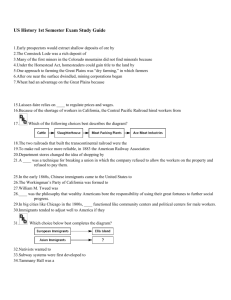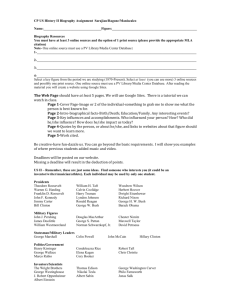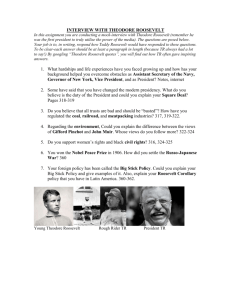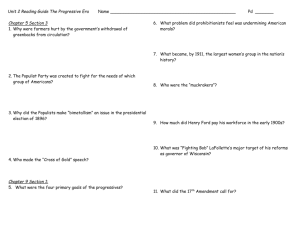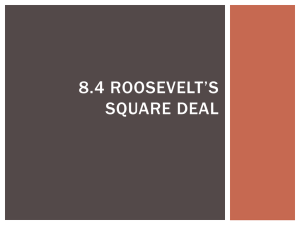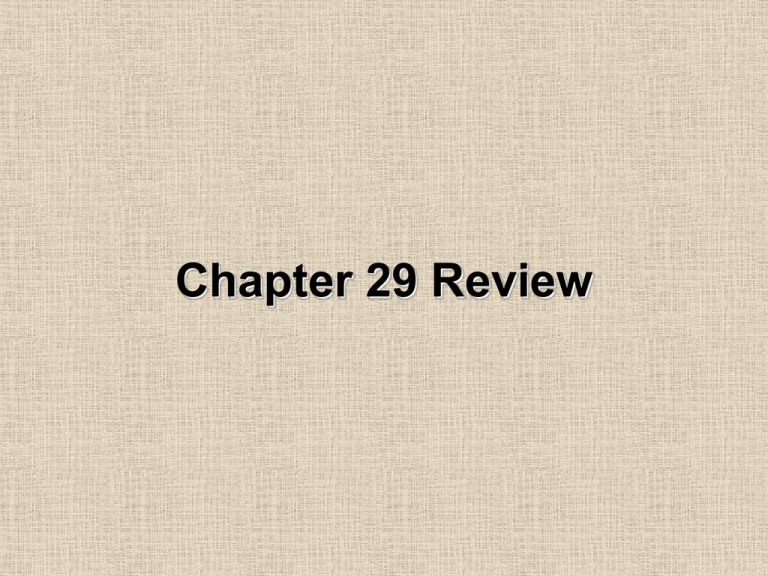
Chapter 29 Review
Muckrakers
• Name applied in 1906 by President Theodore Roosevelt
to a group of journalists who exposed the abuses of
power and corruption in American political and business
life.
• Writers Upton Sinclair, Lincoln Steffens, Jacob Riis
and Ida Tarbell
–
–
–
–
exposed filth in food processing
fraudulent advertising
political corruption
sensationalized accounts in such publications as McClure's,
Everybody's, and Collier's.
• Muckrakers were largely responsible for mobilizing
public opinion in favor of the progressive reform of the
period.
Theodore Roosevelt cartoon "A nauseating job, but it must
be done"
Theodore Roosevelt cartoon "A nauseating job, but it must be done"
Upton Sinclair's novel, The Jungle, published in 1906, prompted President Theodore
Roosevelt to order an investigation of Sinclair's allegations about unsanitary
practices. Roosevelt then used the results of that investigation to pressure Congress
into approving new federal legislation to inspect meatpacking. (Utica Saturday
Globe)
Copyright © Houghton Mifflin Company. All rights reserved.
Stamp--"US Inspected and Condemned"
Stamp--"US Inspected and Condemned"
Upton Sinclair's novel, The Jungle, published in 1906, prompted President Theodore
Roosevelt to order an investigation of Sinclair's allegations about unsanitary
practices. Roosevelt then used the results of that investigation to pressure Congress
into approving new federal legislation to inspect meatpacking, including a stamp
such as the one shown here for condemned meat. (Chicago Historical Society)
Copyright © Houghton Mifflin Company. All rights reserved.
Shoe line--Bowery men with gift from Tim Sullivan, February, 1910
Shoe line--Bowery men with gift from Tim Sullivan, February, 1910
"Big Tim" Sullivan, a New York City ward boss, rewarded "repeat voters" with a new pair of
shoes. Sullivan once explained, "When you've voted ‘em with their whiskers on, you take ‘em
to a barber and scrape off the chin fringe. Then you vote ‘em again…Then to a barber again,
off comes the sides and you vote ‘em a third time with the mustache…[Then] clean off the
mustache and vote ‘em plain face. That makes every one of ‘em for four votes." (Library of
Congress)
Copyright © Houghton Mifflin Company. All rights reserved.
The Masses cover, 1912
The Masses cover, 1912
This socialist publication, edited in New
York's Greenwich Village, denounced
the abuses of capitalism, including child
labor. (Library of Congress)
Copyright © Houghton Mifflin Company. All rights reserved.
The Progressive Movement
1889-1920
• A broad-based campaign for economic, political, and social reforms.
• The movement addressed the power of big business and advocated
aid for farmers and protection for consumers.
• The reforms included passage of the Sixteenth and Seventeenth
Amendments, the Pure Food and Drug Act, the Meat Inspection Act,
and the Sherman and Clayton Anti-Trust Acts.
• Progressives supported initiative, recall, referendum, and direct
primary laws.
• Also during this time, attacks were made on child labor, sweatshops,
slum conditions, and women working excessive hours.
• Leading figures in the Progressive Era included the Muckrakers,
Theodore Roosevelt, Woodrow Wilson, Robert La Follette, Eugene V.
Debs, John Peter Altgeld, Hiram Johnson, William James, John
Dewey, and George Norris.
Tenement clotheslines
Tenement clotheslines
Inner-city dwellers used indoor space as efficiently as possible as well as what little
outdoor space was available to them. Scores of families living in this cramped block
of six-story tenements in New York strung clotheslines behind the buildings. Notice
that there is virtually no space between buildings, so only rooms at the front and
back received daylight and fresh air. (Library of Congress)
Copyright © Houghton Mifflin Company. All rights reserved.
Children in textile mill
Children in textile mill
Factories employed children from the early nineteenth century well into the twentieth. In textile
mills like this one, photographed by Lewis Hines in 1908, girls operated machines, and boys
ran messages and carried materials back and forth. Mill girls had to tie up their hair to keep it
from getting caught in the machines. The girl posing here with a shawl over her head would not
have worn that garment while she was working. (National Archives)
Copyright © Houghton Mifflin Company. All rights reserved.
Visiting nurse
Visiting nurse
This visiting nurse from the Infant Welfare Society is visiting poor families in
Chicago around 1900. Such visiting nurses provided advice on nutrition and
childbearing, and contributed to the emergence of the new field of public health
during the Progressive Era. (Chicago Historical Society)
Copyright © Houghton Mifflin Company. All rights reserved.
Textile worker
Textile worker
Young children like this one were often used in the textile mills because their small
fingers could tie together broken threads more easily than those of adults. (Library of
Congress)
Copyright © Houghton Mifflin Company. All rights reserved.
Amendment XVI
Adopted in 1913
• The Congress shall have power to lay and
collect taxes on incomes, from whatever
source derived, without apportionment
among the several States, and without
regard to any census or enumeration.
The XVII Amendment
Adopted in 1913
• Section 1 The Senate of the United States shall be composed of
two Senators from each State, elected by the people thereof, for six
years; and each Senator shall have one vote. The electors in each
State shall have the qualifications requisite for electors of [voters for]
the most numerous branch of the State legislatures.
• Section 2 When vacancies happen in the representation of any
State in the Senate, the executive authority of such State shall issue
writs of election to fill such vacancies: Provided, that the Legislature
of any State may empower the executive thereof to make temporary
appointments until the people fill the vacancies by election as the
Legislature may direct.
• Section 3 This amendment shall not be so construed as to affect the
election or term of any Senator chosen before it becomes valid as
part of the Constitution.
President Theodore Roosevelt
• Twenty-sixth president of the United States (1901-09). Roosevelt
became a national hero when he led his Rough Riders up Kettle Hill
in Cuba during the Spanish-American War in 1898.
• He then served as Republican governor of New York before being
elected vice president in 1900.
• He is known for his trust busting, programs for conservation of
natural resources, and creation of national parks.
• His Roosevelt Corollary to the Monroe Doctrine claimed the United
States could intervene militarily in the Latin American states.
• He won the Nobel Peace Prize in 1906 for helping negotiate an end
to the Russo-Japanese War. He also initiated the building of the
Panama Canal.
• Roosevelt supported Republican William Howard Taft for
president in 1908 but tried for the Republican nomination in
1912.
• When he lost it to Taft, he split with the Republicans and
started the Progressive, or Bull Moose party, with himself
running for president.
• The split Republicans lost the election to the Democrats and
Woodrow Wilson.
• Roosevelt hoped to gain the Republican nomination in 1916, but the
delegates chose Charles Evans Hughes as their standard-bearer.
New Nationalism
• The Progressive political platform of Theodore
Roosevelt during the election of 1912.
• New Nationalism emphasized political, social,
and economic reforms to be coordinated by the
federal government.
• The philosophy stressed an increase in safety
and welfare laws, as well as taxation of
business.
• Roosevelt opposed Woodrow Wilson's New
Freedom program, arguing that monopolies and
big business should not be destroyed but be
controlled by regulatory commissions.
The Square Deal
• The Three C’s: creating a square deal for
capital, labor and the public at large
– Control of the corporations
– Consumer protection
– Conservation on natural resources
• Eventually Congress creates Department
of Commerce and Labor (through
Roosevelt’s urging)
– This helps break the monopolies and starts
the era of trust busting.
Panic of 1907
• Panic fell on Wall Street creating runs on
banks, suicides, and criminal indictments
against speculators.
• But it did allowed for reform
• In 1908 Congress passed the AldrichVreeland Act, which authorized national
banks to issue emergency currency
backed by various kinds of collateral.
• This Act is the prequel to the Federal
Reserve Act of 1913.
Theodore Roosevelt and Gifford Pinchot
Theodore Roosevelt and Gifford
Pinchot
The two friends and allies in the
conservation cause aboard the steamboat
Mississippi on a 1907 tour with the
Inland Waterways Commission. (Library
of Congress)
Copyright © Houghton Mifflin Company. All rights reserved.
Gifford Pinchot
• Politician and conservationist.
• Pinchot served as chief of the Development of Agriculture's
Division of Forestry during the presidency of Theodore
Roosevelt, significantly influencing Roosevelt's conservation
policies.
• During President William Howard Taft's administration, he
became embroiled in the Ballinger-Pinchot Controversy
– Pinchot accused Ballinger improperly used his office to help the
Guggenheims and other powerful interests illegally gain access to
Alaskan coal fields
– Pinchot was fired for his accusations and this ultimately divided the
Republican Party
– Pinchot founded the National Conservation Association and developed a
systematic forestry program.
• He later served two terms as governor of Pennsylvania (192327, 1931-35).
Theodore Roosevelt with John Muir at Yosemite, 1903
Theodore Roosevelt with John Muir at
Yosemite, 1903
In 1903, at Yosemite National Park,
Theodore Roosevelt met with John Muir,
a leading advocate for the preservation
of wilderness. While Roosevelt made
important contributions to the
preservation of parks and wildlife
refuges, he was more interested in the
careful management of national
resources, including federal lands.
(Yosemite Museum)
Copyright © Houghton Mifflin Company. All rights reserved.
Postcard with Taft cartoon
Postcard with Taft cartoon
This postcard depicts how President Theodore Roosevelt, in command of the
Republican Party, persuaded his friend William Howard Taft to run for president in
1908. Taft was not eager for that office, but Roosevelt succeeded in convincing him
to seek it. With Roosevelt's strong support, Taft was elected, but he proved a
disappointment to Roosevelt. (Collection of Janice L. and David J. Frent)
Copyright © Houghton Mifflin Company. All rights reserved.
William Howard Taft
• Twenty-seventh president of the United States (1909-13) and tenth chief
justice of the United States (1921-30).
• Born in Cincinnati, Ohio, Taft graduated from Yale University.
• A Republican, he served as the first governor-general of the Philippines
and as secretary of war under Theodore Roosevelt.
• Roosevelt chose Taft as the candidate to succeed him, and he defeated
the Democratic candidate William Jennings Bryan in the Election of 1908.
• During Taft's administration, the Sixteenth Amendment was passed,
allowing Congress to levy a federal income tax.
• Although Taft was not considered a trust-buster, he instituted twice as
many antitrust proceedings as his predecessor.
• Taft also instituted Dollar Diplomacy:
– an unproductive program that promoted the use of trade and commerce
to increase the nation's diplomatic influence, especially in the Caribbean
and Asia.
• Although Taft survived a challenge for the Republican nomination in 1912,
Roosevelt's formation of the Progressive Party split the party, and
Democratic candidate Woodrow Wilson won the election.
• President Warren G. Harding named Taft chief justice on the
Supreme Court in 1921, the job he had always wanted. He was the
only man to serve as both president and chief justice.

